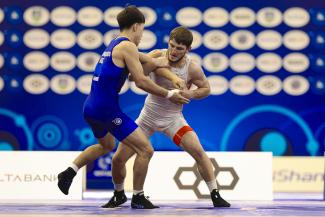NOVI SAD, Serbia (October 20) -- Vitalie ERIOMENCO (MDA) has already won the gold medal at the U23 World Championships. The Moldovan won gold in the 63kg weight class in Tirana, Albania last year.
In a bid to repeat, Eriomenco entered the 2025 edition as well, making it his fifth appearance the season-ending World Championships. Now, Eriomenco is one win away from defending his world title.
The recent bronze medalist in Zagreb, Eriomenco made it to the 63kg final at the U23 Worlds in Novi Sad, Serbia on Monday and will face a familiar opponent in the final in Ziya BABASHOV (AZE).
The two met in the U23 European Championships final earlier this year which Eriomenco won 3-1. However, Babashov had defeated the Moldovan in the final of the same tournament in 2024.
With the head-to-head locked at 1-1, Eriomenco and Babashov will clash Tuesday, the second day of the U23 Worlds which kicked off in Serbia on Monday with four Greco-Roman weight classes.
Iran and Ukraine had two finalists each while Georgia and Armenia also managed to get one each on the first day. Iran was led by world 82kg champion Gholamreza FAROKHI (IRI) who has moved up to 87kg but unbothered by the weight change. Defending champion at 130kg Fardin HEDAYATI (IRI) returned to the final as well.
Eriomenco was heads above the field at 63kg as he won his four bouts via technical superiority. In the semifinals, he faced Kuttubek ABDURAZAKOV (KGZ) but had no trouble beating the Kyrgyzstan wrestler 10-1, scoring four turns from par terre.
Babashov on the other hand had to work hard for his 2-1 victory over Servet ANGI (TUR) in the other semifinal. He got on the scoreboard first as he scored a stepout using a two-on-one to lead 1-0. He was given the par terre position soon after but he failed to score. He still had a 2-0 lead going into the break.
Angi got his chance in the par terre in the second period but he failed to score any points over Babashov who defended his 2-1 lead to enter the final. He would now hope to repeat the performance from 2024 U23 Euro final which he won against Eriomenco 3-2.
At 87kg, Farokhi was also in top form, winning all his four bouts via technical superiority. He faced Payton JACOBSON (USA) in the semifinals but took no time as he rolled him four times from par terre to win 9-0 and advance to the final.
He will face Ivan CHMYR (UKR) for the gold medal bout after the Ukrainian defeated a surprise semifinalist in Yassine BEN LABED (POL), 2-1. Chmyr, who finished fifth at the U23 European Championships this year, held his own to beat Ben Labed.
Chmyr began with a win over Andrija MIHAJLOVIC (SRB) before beating Achiko BOLKVADZE (GEO), 1-1. He then handed U23 Euro silver medalist Vladimeri KARCHAIDZE (FRA) a 3-1 defeat.
In the semifinals against Ben Labed, who had beaten Ruben GEVORGYAN (ARM), Deni NAKAEV (GER) and Brian RUIZ (VEN) to reach last four, Chmyr threw Ben Labed out of bounds from par terre to lead 2-0.
But when Ben Labed got a chance in par terre, there were no points scored and Chmyr booked a place in the final against world champion Farokhi.
Hedayati, the multiple-time age-group world champion, is closer to another title at 130kg after he reached the final. He defeated Laszlo DARABOS (HUN), 4-0, in the semifinals using a stepout and a takedown on either side of the par terre position.
He will face Ramzik KURDYAN (ARM) in the final after the Armenian defeated Aleksandr MELEKHOV (UWW), 5-1, in the final. Kurdyan, who has a silver from U17 Worlds in 2019, rolled Melekhanov twice from par terre after defending his par terre position to win 5-1.
At 77kg, Irfan MIRZOIEV (UKR) upset European 72kg champion Levente LEVAI (HUN), 2-2, to reach the final as he looks to better his silver medal from 2022. Levai had a clear 2-1 lead in the semifinals when he scored takedown on the edge.
Levai increased his lead to 4-1 but Ukraine challenged and a foul was confirmed by Levai and he docked a point for stepping out which made the score 2-2 with Mirzoiev lead on last-point scored criteria. He defended that lead to reach the final for the second time in his career.
Temuri ORJONIKIDZE (GEO) will try to stop him from winning the gold medal on Tuesday after he got the better of U23 Asian champion Doniyorkhon NAKIBOV (UZB), 6-2.
Nakibov got the first par terre position but was blocked by Orjonikidze who scored a reversal and turn to lead 3-1. Georgia challenged asking for four points and on review it was confirmed that Nakibov fell in danger for four points.
With a 5-1 lead, Orjonikidze went into the passive mode and was put down in par terre in the second period. Nakibov tried to score with a turn but Orjonikidze never came in danger.
Uzbekistan challenged asking for two points but it was lost, giving one more point to Orjonikidze who won 6-2 and reach the final.
RESULTS
63kg
GOLD: Ziya BABASHOV (AZE) vs. Vitalie ERIOMENCO (MDA)
SF 1: Ziya BABASHOV (AZE) df. Servet ANGI (TUR), 2-1
SF 2: Vitalie ERIOMENCO (MDA) df. Kuttubek ABDURAZAKOV (KGZ), 10-1
77kg
GOLD: Temuri ORJONIKIDZE (GEO) vs. Irfan MIRZOIEV (UKR)
SF 1: Temuri ORJONIKIDZE (GEO) df. Doniyorkhon NAKIBOV (UZB), 6-2
SF 2: Irfan MIRZOIEV (UKR) df. Levente LEVAI (HUN), 2-2
87kg
GOLD: Gholamreza FAROKHI (IRI) vs. Ivan CHMYR (UKR)
SF 1: Gholamreza FAROKHI (IRI) df. Payton JACOBSON (USA), 9-0
SF 2: Ivan CHMYR (UKR) df. Yassine BEN LABED (POL), 2-1
130kg
GOLD: Fardin HEDAYATI (IRI) vs. Razmik KURDYAN (ARM)
SF 1: Fardin HEDAYATI (IRI) df. Laszlo DARABOS (HUN), 4-0
SF 2: Razmik KURDYAN (ARM) df. Aleksandr MELEKHOV (UWW), 5-1



Share your thoughts.
Comments